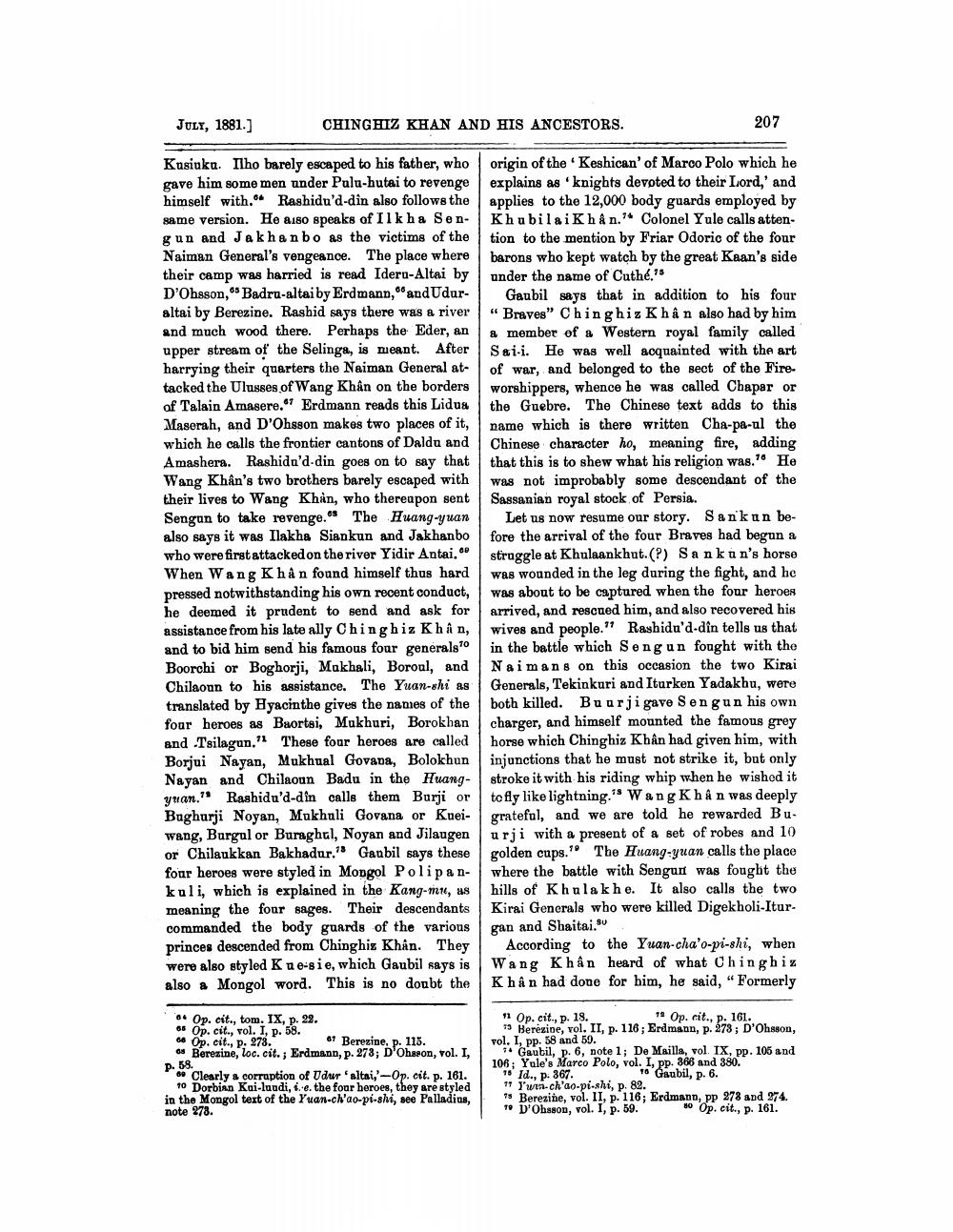________________
JULY, 1881.]
CHINGHIZ KHAN AND HIS ANCESTORS.
207
Kusiuku. Ilho barely escaped to his father, who origin of the Keshican' of Marco Polo which he gave him some men under Pulu-hutai to revenge explains as 'knights devoted to their Lord,' and himself with.c* Rashidu'd-din also follows the applies to the 12,000 body guards employed by same version. He 180 speaks of Ilkha Sen- Khu bilai Khan." Colonel Yule calls attengun and Jakhan bo as the victims of the tion to the mention by Friar Odoric of the four Naiman General's vengeance. The place where barons who kept watch by the great Kaan's side their camp was harried is read Ideru-Altai by under the name of Cuthé. D'Ohsson, "Badru-altai by Erdmann,"aud Udur- Gaubil says that in addition to his four altai by Berezine. Rashid says there was a river "Braves" Chinghiz Khan also had by him and much wood there. Perhaps the Eder, an a member of a Western royal family called upper stream of the Selinga, is nieant. After Sai.i. He was well acquainted with the art harrying their quarters the Naiman General at- of war, and belonged to the sect of the Firetacked the Ulusses of Wang Khân on the borders worshippers, whence he was called Chapar or of Talain Amasere." Erdmann reads this Liduathe Guebre. The Chinese text adds to this Maserah, and D'Ohsson makes two places of it, name which is there written Cha-pa-ul the which he calls the frontier cantons of Daldu and Chinese character ho, meaning fire, adding Amashera. Rashida'd-din goes on to say that that this is to shew what his religion was." He Wang Khân's two brothers barely escaped with was not improbably some descendant of the their lives to Wang Khản, who thereapon sent Sassanian royal stock of Persia. Sengan to take revenge. The Huang-yuan Let us now resume our story. Sankun bealso says it was Ilakha Siankun and Jakhanbofore the arrival of the four Braves had begun a who were first attacked on the river Yidir Antai." struggle at Khulaankhut.(?) Sankan's horse When Wang Khan found himself thus hard was wounded in the leg during the fight, and he pressed notwithstanding his own recent conduct, was about to be captured when the four heroes he deemed it prudent to send and ask for arrived, and rescued him, and also recovered his assistance from his late ally Chinghiz Khan, wives and people." Rashidu'd-dîn tells us that and to bid him send his famous four generals in the battle which Sengun fought with the Boorchi or Boghorji, Makhali, Boroul, and Naimans on this occasion the two Kirai Chilaoun to his assistance. The Yuan-shi as Generals, Tekinkuri and Iturken Yadakhu, were translated by Hyacinthe gives the names of the both killed. Buurji gave Sen gun his own four heroes as Baortsi, Mukhuri, Borokban charger, and himself mounted the famous grey and Tsilagun." These four heroes are called horse which Chinghiz Khân had given him, with Borjui Nayan, Mukhual Govana, Bolokhun injunctions that he must not strike it, but only Nayan and Chilaoun Badu in the Huang- stroke it with his riding whip when he wished it yuan." Rashidu'd-din calls them Burji or to fly like lightning. Wang Khan was deeply Baghurji Noyan, Mukhuli Govana or Kuei- grateful, and we are told he rewarded Buwang, Burgul or Buraghul, Noyan and Jilaugen urji with a present of a set of robes and 10 or Chilaukkan Bakhadur, Gaubil says these golden cups." The Huang-yuan calls the place four heroes were styled in Mongol Polipa n- where the battle with Sengurt was fought the kuli, which is explained in the Kang-mut, as hills of Khalakhe. It also calls the two meaning the four sages. Their descendants Kirai Generals who were killed Digekholi-Itur. commanded the body guards of the various gan and Shaitai.eu princes descended from Chinghiz Khan. They According to the Yuan-cha'o-pi-shi, when were also styled K u e-sie, which Gaubil says is Wang Khân heard of what Chingiz also a Mongol word. This is no doubt the Khân had done for him, he said, "Formerly
* Op. cit., tom. IX, p. 22. 65 Op. cit., vol. I, p. 58. 06 Op. cit., p. 273. 67 Berezine, p. 115. os Berezine, loc. cit.; Erdmann, p. 273; D'Ohsson, vol. I, * Clearly a corruption of Udur'altai,'-Op. cit. p. 161.
10 Dorbian Kai-laudi, 6. e. the four heroes, they are styled in the Mongol text of the Yuan-ch'ao-pi-shi, see Palladius, note 273.
P. 58.
"Op. cit., p. 18.
* Op. cit., p. 161. 13 Berezine, vol. II, p. 116; Erdmann, p. 278; D'Ohsson, vol. I, pp. 58 and 50.
** Gautil, p. 6, note 1; De Mailla, vol. IX, pp. 105 and 106; Yule's Marco Polo, vol. I, pp. 366 and 380. 15 Id., p. 367.
Gaubil, p. 6. " Y'win.ch'ao-pi.shi, p. 82. * Berezine, vol. II, p. 116; Erdmann, pp 278 and 274. ** D'Ohsson, vol. I, p. 59.
40 Op. cit., p. 161.




